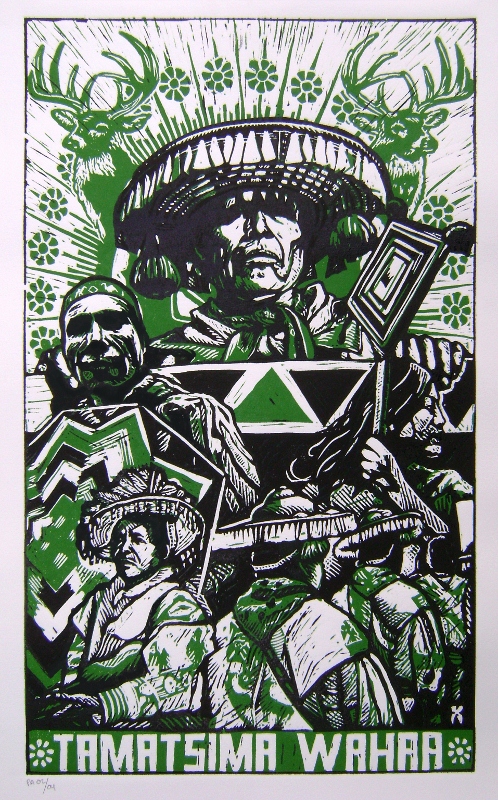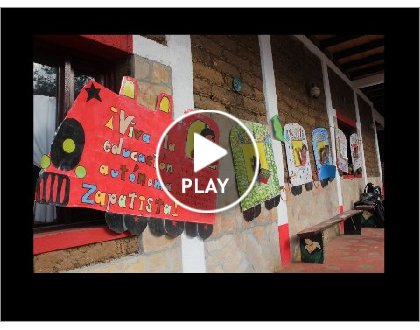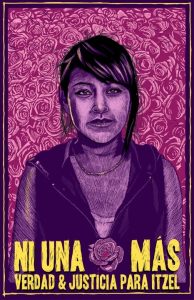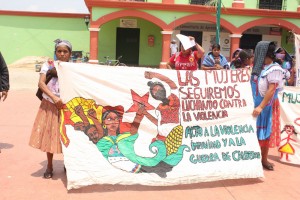Radio Zapatista
Marcha en memoria de Itzel Méndez Pérez y contra el feminicidio
One month after the murder of 17-year-old Itzel Méndez Pérez, hundreds of people protested in San Cristóbal de Las Casas, Chiapas, against feminicide and violence against women. The march started at the Faculty of Social Sciences and went to Fraccionamiento Sonora, where the body of Itzel Méndez was found. From there it went to the plaza of the Cathedral, where civil organizations and residents of the city declared San Cristóbal an unsafe city.
Palabras del padre de Itzel en el local donde se encontró el cuerpo de la joven
(Descarga aquí)
Palabras de la madre de Itzel en la Facultad de Ciencias Sociales
(Descarga aquí)
Pronunciamiento de compañeras en manifestación en Tuxtla Gutiérrez
(Descarga aquí)
Pronunciamiento de denuncia contra el feminicidio y la violencia contra la mujer
(Descarga aquí)
Palabras de la madre de Itzel frente a la Catedral
(Descarga aquí)
Palabras del padre de Itzel frente a la catedral
(Descarga aquí)
Foro contra la prisión política y por la libertad de Alberto Patishtán
12 de Mayo de 2012
Cideci/Unitierra
San Cristóbal de Las Casas, Chiapas
Para más información: foroporlalibertad.noblogs.org
Mañana – Moderación: Centro de Derechos Humanos Fray Bartolomé de Las Casas (Frayba)
Presentación del foro (4:45 min)
(Descarga aquí)Presentación de las mesas (Frayba – español y tseltal) (8:30 min)
(Descarga aquí)Lectura de la denuncia del Caracol de la Junta de Buen Gobierno de Oventic del 27 de marzo de 2012 sobre el caso de Francisco Sántiz López (16:45 min)
(Descarga aquí)Palabras de Marcelino Hernández (Frayba) sobre el caso de Alberto Patishtán (tselsal) (6:20 min)
(Descarga aquí)Palabras de Jorge Luiz Hernández Castro (Frayba) sobre el caso de Alberto Patishtán (15:45 min)
(Descarga aquí)Caso de Alberto por su hija, Grabriela Patishtán (13:50 min)
(Descarga aquí)Palabras de Andrés Núñez, ex compañero de Patishtán en el Cereso 5 y miembro de La Voz del Amate (13:10 min)
(Descarga aquí)Palabras del profesor Martín Ramírez López, de la comunidad de El Bosque (16:30 min)
(Descarga aquí)Los solidarios de la Voz del Amate, Andrés y José, ex presos (audio) (3 min)
(Descarga aquí)Carta de la Confederación General del Trabajo (CGT), Estado Español (4:13 min)
(Descarga aquí)Dora Julieta Hernández Gómez (Brigada Feminista) sobre la condición de las mujeres presas y el caso de Rosa López (24:40 min)
(Descarga aquí)Represión en San Sebastián Bachajón (5:45 min)
(Descarga aquí)Chalino Sandría y Blas Pérez del Consejo Autónomo Regional de la Costa sobre la situación en la Zona Costa de Chiapas (8:40 min)
(Descarga aquí)Tarde – Moderación Concepción Suárez
Impacto de los penales de máxima seguridad – Colectivo IK
- Mario Ruiz – Serapaz (trad. tseltal) (Descarga aquí)
- Guillermo Villaseñor (español) (Descarga aquí)
Prisión política – Cruz Negra Anarquista
- Catalina López Gómez – Centro de Derechos de la Mujer Chiapas (trad. tseltal) (Descarga aquí)
- Iván Torres (Descarga aquí)
Campaña contra la represión política y la Tortura Sexual
- Mario Ruiz (trad. tseltal) (Descarga aquí)
- Norma Jiménez (español) (Descarga aquí)
Carta por La Pirata, articulación de colectivos de Italia, Suiza y Holanda
- Traducción en tseltal (Descarga aquí)
- Lectura en español (Descarga aquí)
Abraham Ramírez Vásquez del Codedi-Xanica (AMZ) Oaxaca
- Abraham Ramírez (Descarga aquí)
- Traducción en tseltal (Descarga aquí)
Víctor Herrera Govea, ex preso DF
- Traducción tseltal (Descarga aquí)
- Palabras de Mary Herrera Govea, hermana de Víctor (Descarga aquí)
Carta de la Plataforma Vasca de Solidaridad con Chiapas, Bilbao
- Lectura en español (Descarga aquí)
- Traducción en tseltal (Descarga aquí)
Situación de los presos de Guerrero – Tadeco
- Introducción (Descarga aquí)
- Síntesis en tseltal (Descarga aquí)
- Audio – saludo enviado por el preso Máximo Mujica (Descarga aquí)
- Isabel Rosales Juárez (Tadeco) (Descarga aquí)
Caso de Álvaro Sebastián Ramírez, preso político loxicha, Oaxaca
- Síntesis en tseltal (Descarga aquí)
- Érica Sebastián Luiz (hija) (Descarga aquí)
- Eric Passan Azevedo (Descarga aquí)
Video de la campaña por la liberación de Álvaro Sebastián Ramírez:
Carta del colectivo Les Trois Passants, Francia
- Lectura en español (Descarga aquí)
- Traducción en tseltal (Descarga aquí)
La digna lucha de San Salvador Atenco
- Síntesis en tseltal (Descarga aquí)
- Ignacio del Valle (Descarga aquí)
Ve también la cobertura en La Jornada:
- Patishtán, condenado a morir en prisión por una venganza política (13/05/2012)
- En manos del Ejecutivo, indulto al indígena Alberto Patishtán (12/05/2012)
- Paramilitares atacan a ejidatarios de San Sebastián Bachajón; uno agoniza, dicen (11/05/2012)
- Efectuarán campaña internacional por la liberación de Alberto Patishtán y Francisco Santiz López (09/05/2012)
- Reportan ejidatarios de San Sebastián Bachajón hostigamientos constantes (04/05/2012)
- Abogan por adherente de la otra campaña preso en El Amate (30/04/2012)
- Exigen desplazadas zapatistas la presentación de su padre (29/04/2012)
- Siguen las detenciones y torturas contra indígenas adherentes de la otra campaña (28/04/2012)
- Indígenas denuncian “intensa tortura” policiaca en Chiapas (26/04/2012)
- Arrecia la campaña por la liberación del activista Alberto Patishtán (24/04/2012)
- Anuncian foro en San Cristóbal para exigir liberación de indígenas presos (23/04/2012)
- Preparan en NY semana de lucha por Patishtán y Sántiz (22/04/2012)
- Junta de Buen Gobierno corazón centrico del los Zapatistas delante del mundo (29/03/2012)
- A punto de abandonar la cárcel, nuevo cargo a Francisco Santiz (29/03/2012)
- Exigen atención médica para presos zapatistas (22/03/2012)
- Exigen en Chiapas liberar a Patishtán (19/03/2012)
- Denuncian prisión injusta de una base de apoyo del EZLN (18/03/2012)
- Retrasa el gobierno de Chiapas aplicación de amparo otorgado al maestro Patishtán (17/03/2012)
- Presentan informe sobre situación jurídica del profesor tzotzil Alberto Patishtán (16/03/2012)
- Piden Frayba y familiares la liberación inmediata del tzotzil Alberto Patishtán (13/03/2012)
Invitación al Foro en audio: (Descarga aquí)
Demo against the militarization of the territory – Chiapas
El 11 de Mayo de 2012 se llevó acabo una marcha contra la militarización del Territorio que culminó con un mitin en Amatenango del Valle, Chiapas. Ahí dieron su palabra las mujeres que se manifestaron en contra de la guerra, la militarización, los proyectos de despojo y afirmaron su sí a la vida y a la defensa de la madre tierra. A continuación, el contenido de uno de los comunicados que contiene una grave denuncia de la incursión y el efectivo posicionamiento de la Marina Nacional en territorio comunitario.
Sustainable Rural Cities: From Land to Asphalt
Esta noche se presentó en el Centro Cultural TierrAdentro, en San Cristóbal de Las Casas, Chiapas, el Informe de la Misión Civil de Obasrvación de la Red por la Paz Chiapas y Colectivo de Análisis e Información Kolectiva (CAIK) al programa Ciudades Rurales Sustentables: De la tierra al asfalto.
Presentación
(Descarga aquí)
Introducción y contexto
(Descarga aquí)
¿Prevención de riesgos?
(Descarga aquí)
Violaciones a derechos humanos
(Descarga aquí)
Conclusiones
(Descarga aquí)
Report from May Day 2012 in NYC
As over 125 cities across the US and countless others around the world began to mobilize, Radio Zapatista headed into New York City to participate in the dense and diverse program of May Day activities. This special report features interviews and audio from the Free University at Madison Square Park; the “Pop-Up Occupation” at Bryant Park; the Occupy Guitarmy; the rally & concert in Union Square; and the massive march to Wall St
In defense of Wirikuta! Voice from our brothers and sisters wirrarikas

In this audio we hear the words of Jesús Lara, Secretary of the Main Council (Consejo Mayor) of the Wixárika peoples. He speaks about the meaning of Wirikuta, the threats the sacred place faces and the struggle for its defense.
(Descarga aquí)
For more info: www.frenteendefensadewirikuta.org/
(Continuar leyendo…)






